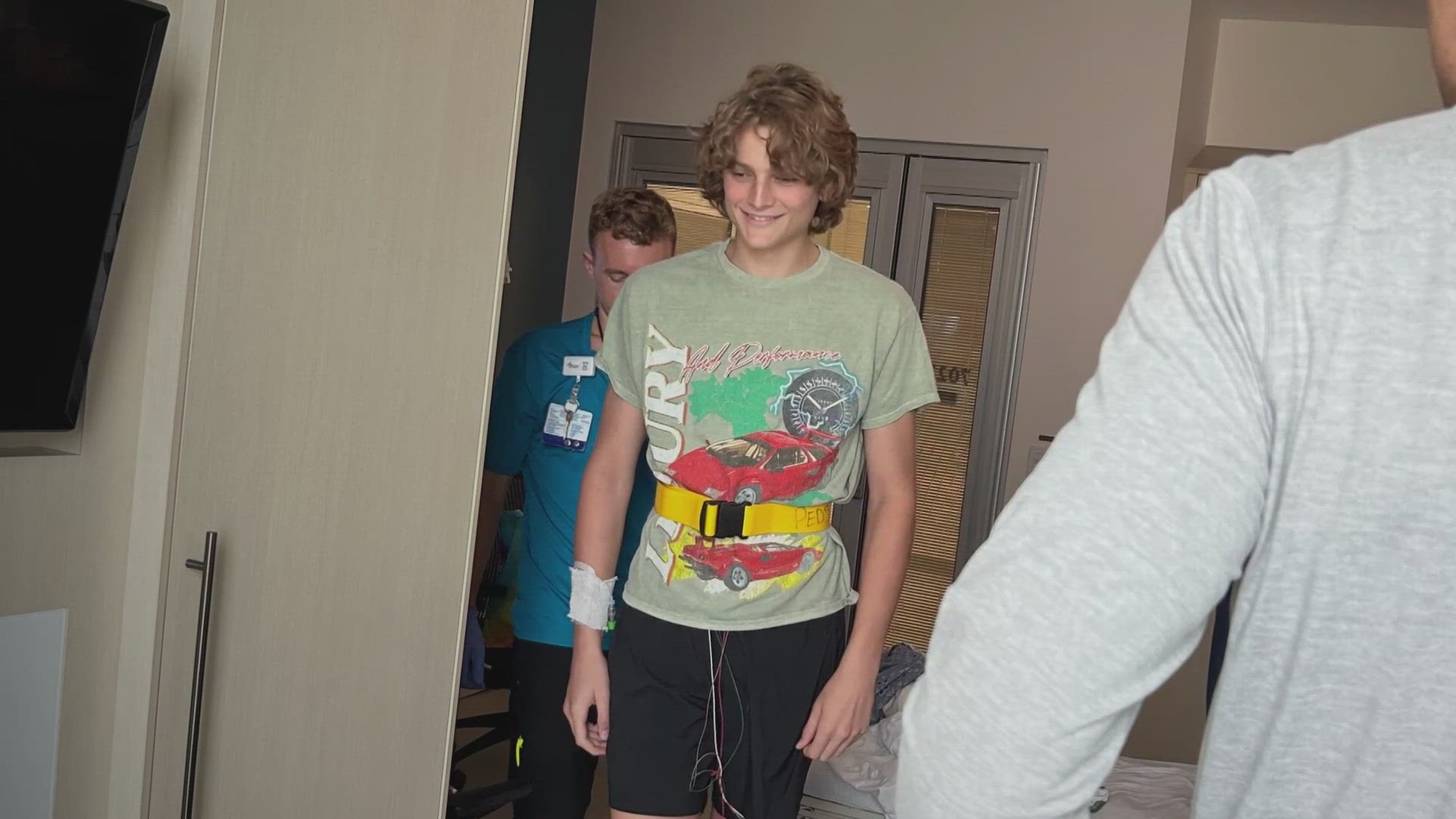ST. JOHNS COUNTY, Fla. — When Ryder Radecki went to basketball practice last summer at Bartram Trail High School, he showed no signs of what was about to happen.
“He left Monday morning for practice, and he was a perfectly healthy kid,” his dad, Kurt Radecki, said.
But in a split second everything changed for the 16-year-old. He ran into his teammates shoulder, which hit his chest.
Dizzy, he felt his heart racing.
“Ryder called me from practice," his dad said. "Thank you to his coach, Coach T. He basically started the process to save Ryder's life. He had Ryder call me."
“I just noticed right away that my heart was just beating a lot faster,” Ryder said. “I called my dad and just told my coach, 'I think I'll be fine. I'll just sit out for the rest of practice.'”
But when he got home, Kurt Radecki says he knew something was wrong. “His heart was beating fast and slow. It was beating heavy, and it was beating light, and it just was not like nothing I've ever felt before."
He took his son to Wolfson Children's Emergency Room at Baptist South. The staff knew right away that it was serious. But Ryder was "really chipper... jovial," his dad said. One minute, he had plenty of energy and was kidding around. But hours later he suffered sudden cardiac arrest.
“He basically fell over," Kurt Radecki remembered. "Ad I caught him in his ER bed because he went into cardiac arrest.”
For three minutes he says they worked to revive his son.
“They did the AED with paddles. It didn't work. They did CPR,” Kurt Radecki said. “And then they did the paddles again. And he came back."
Ryder was airlifted to Wolfson Children’s Hospital downtown. Dr.Bhavya Trivedi says he was diagnosed with Wolff-Parkinson-White syndrome, also known as WPW.
“In Ryder’s case, he had a true extra electrical pathway in his heart that was previously undiagnosed. The only way to diagnose it would have been if he had an EKG before,” Dr. Trivedi said.
After six days in the hospital, Ryder’s mother, Erin Radecki, was glad her son could finally go home.
“Every morning I feel so grateful," Erin Radecki said. She wishes everyone could have the same outcome as her son. “If any of your kids ever think, ‘My chest feels weird’, but they look perfectly fine, take them to the hospital, let the professionals test them, make sure, because they do look perfectly fine and their heart is not.”
Sudden cardiac arrest is the number one cause of death in the U.S. for student athletes during exercise.
Days after Ryder's mother posted about his heart condition, on Facebook a neighbor whose son is a collegiate baseball player, called her about her son’s EKG results.
“I could tell she was rattled. Her son was a Florida State freshman, (he) was going through their screening process,” Erin Radecki said. “And they found WPW in him. And, you know, we heard from how many people it's rare. I don't think it's rare anymore. I think we're not diagnosing kids.”
“It’s one of those things where we were ahead of it because of a simple screening,” Rola DeLamielleure said. “He’s had a physical every single year since maybe middle school, and never has anybody done an EKG until he got to Florida State. So, we're just grateful that they found it, and we were able to get ahead of it considering what other families have gone through.”
First Coast News met with Rola DeLamielleure's and her son, Brody DeLamielleure, just a week after he had an ablation, the same minimally invasive procedure Ryder had.
“You never think that would happen to you. Just because you've never had symptoms. You seem healthy. You feel healthy. You look healthy,” Brody DeLamielleure said. “And you just realize that like, just one day I could have dropped on the field. It's just kind of wild. And I'm glad they picked it up. And I was glad I got the screening.”
“It's a serious heart condition, life-threatening condition that with one procedure we can cure it,” Dr. Trivedi said.
It’s an easily detectable heart condition with a simple heart screening.
“I don't know why anybody wouldn't get an EKG,” Rola DeLamielleure said. “I mean, I can't imagine the other way. It's like you're a ticking time bomb otherwise.”
Brody and Ryder are both now cured according to Dr. Trivedi.
“I think the thing that that bothers us the most is that it was preventable,” Kurt Radecki said. “So, all of the things that Ryder went through in terms of the cardiac arrest could have been prevented with an EKG.”
First Coast News is teaming up with the nonprofit, Who We Play For, for a free heart screening event Monday, January 8, 2024. All students age 10 to 22 can register now for an electrocardiogram. For details and to reserve a spot for your child click here, scroll down and click "sign up."

